
Navy SEAL candidates endure the Hell Week crucible of Basic Underwater Demolition/SEAL training in Coronado, Calif., on Oct. 31, 2023. In a report released Thursday, the Defense Department Inspector General called for a review of sleep deprivation tactics used in SEAL training, after a recent investigation highlighted safety risks. (Alex Kerska/U.S. Navy)
Navy SEAL Hell Week trainers need a more clear-cut policy on using sleep deprivation on recruits, according to a new troop safety investigation that reviewed measures taken after a sailor died during the grueling ordeal.
Although the Defense Department Inspector General acknowledged in its Thursday report that Naval Special Warfare was doing a better job of ensuring the safety of SEAL recruits during training, there is room for improvement, according to the IG.
The focus on their well-being amid the rigors of SEAL training follows the February 2022 death of Kyle Mullen, who fell ill during the Hell Week selection process.
A culminating event for SEAL candidates, Hell Week is designed to test recruits’ grit during more than 100 consecutive hours of training spanning six days. But the use of sleep deprivation as a training tactic during the event appeared to be applied haphazardly, the IG said.
Navy officials couldn’t provide the IG with clear rationale for the timing, length or number of sleep periods allowed during training, the report said.
Investigators also couldn’t identify DOD policies providing “purpose, applicability, and guidance for intentionally depriving candidates of sleep.”

A Navy SEAL candidate participates in Basic Underwater Demolition/SEAL training in Coronado, Calif., on April 13, 2018. The Defense Department Inspector General is now recommending clearer guidelines for sleep deprivation during SEAL training. (Abe McNatt/U.S. Navy)
The IG recommended that Navy Special Warfare develop and implement a sleep deprivation policy establishing written guidance that incorporates results from ongoing medical studies to minimize safety concerns.
Mullen’s death prompted multiple military investigations, which ultimately determined that the 24-year-old did not receive appropriate medical care and may have been discouraged from seeking it.
Investigators determined that Mullen died of cardiac arrest that was caused by pneumonia, with an enlarged heart as a contributing factor.
Between February 2022 through January 2024, the Navy and U.S. Special Operations Command responded with various changes to improve medical care and safety for Navy SEAL candidates.
Those reforms have addressed some of the concerns surrounding medical screenings and care provided during intense SEAL training, the IG said. DOD investigators observed some of the changes during Hell Week in September 2023.
In its report Thursday, the IG raised further concerns about potential burnout for medical staffers providing treatment during SEAL training. Navy officials should reassess staffing requirements to ensure that enough medical providers are on hand, investigators said.
It also urged the Defense Department to clarify its definition for performance-enhancing drugs. Questions about steroid abuse among special operations troops have been a long-standing health concern.
“The Navy’s ability to deter the use of PEDs, a set of dangerous and sometimes deadly drugs, is also impacted because DoD policy does not define PEDs or state whether steroids are considered PEDs,” the IG report said.